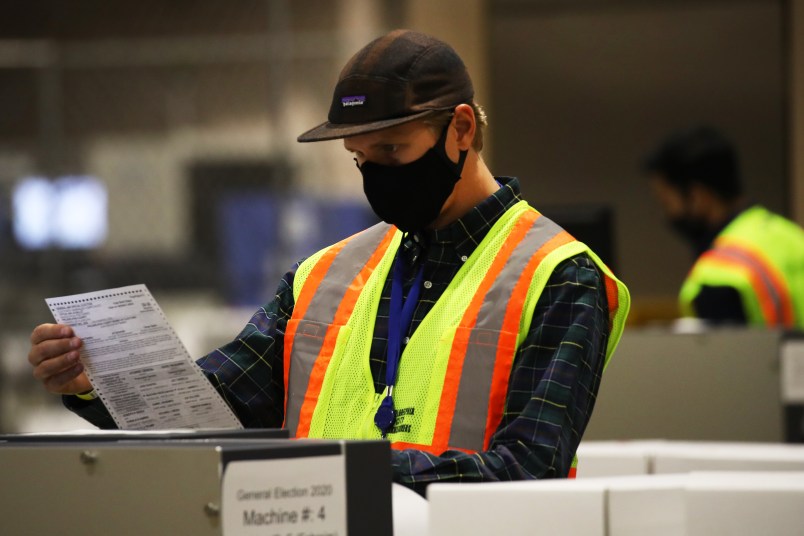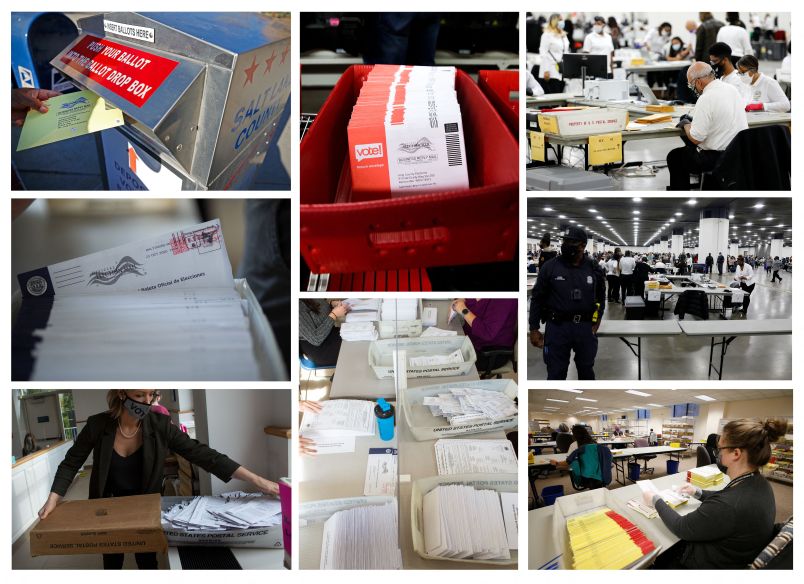Late into election night 2020, Donald Trump emerged with a message.
He was ahead in Pennsylvania, he said, declaring that it was “not close,” and that “with 64 percent of the vote in, it’s going to be almost impossible to catch.” There was one solution, Trump assured the country, and everyone, he said, agreed on it: “We all want voting to stop.”
“We don’t want them to find any ballots at four o’clock in the morning and add them to the list,” he proclaimed.
Contra the then-President’s wishes, Pennsylvania duly completed the rest of its vote count. Biden emerged as the winner by more than 80,000 votes.
But that multi-day period of delay in confirming the final result gave Trump a critical opportunity to lob his farcical claims of voter fraud at the public, seizing on a “red mirage” in which early results trended more Republican when compared to later-arriving Democratic results.
Next month, the country’s largest and most important swing state will likely repeat that delay. Pennsylvania Republicans have for the past four years blocked an easy fix that could allow the state to complete the count in as fast as a day, holding it hostage with a demand for strict voter ID requirements.
The fix comes down to pre-canvassing, the obscure but necessary process that allows election workers to verify the outside envelope of mail-in and absentee ballots before an election. In Pennsylvania, unlike many other states, officials are not allowed to begin that process until 7 a.m. on Election Day. In a state which, since 2019, has had expansive mail-in voting it’s a recipe for long delays and a prolonged lack of clarity around the result. And while that manifests in anxiety for most of the country, for Trump, it’s an opportunity: he can use the time, as he did in 2020, to claim any loss is illegitimate.
Delays, Conspiracy Theories and a Legislative Stalemate
Experts, politicians and local voting officials agree on the solution to this: Other states give poll workers more time — weeks, in some cases — to pre-canvass the surge of mail-in ballots. A simple legislative fix could see Pennsylvania provide a result hours, not days, after polls close. Florida and other GOP-leaning states have adopted similar solutions.
But instead, state Republicans have held legislation to make the fix hostage with a demand of their own: requiring voter ID for elections. It’s a significant stalemate amid a year-long volley of lawsuits asking courts to shape the playing field of the 2024 election, with the Republican National Committee joining in a lawsuit that seeks to deprive voters of the ability to fix errors in the information placed on the outside envelope of a mail-in ballot.
That GOP stonewalling has left Pennsylvania’s canvassing procedures unchanged, with the same 2020 delay likely to repeat itself in November.

Yet the state legislature has succeeded in making another post-2020 fix: banning “Zuckerbucks,” a component of a 2020 Stop the Steal conspiracy theory which laid Trump’s defeat at the feet of Facebook founder Mark Zuckerberg. Per the conspiracy theory, which is byzantine — but relatively more grounded than fellow-traveling 2020 fantasies like ItalyGate — Zuckerberg rigged the election by contributing to a nonprofit, which then provided grants to help county election offices cope with administering the 2020 election. Per the new law, passed in 2022, it’s a crime for any non-governmental entity to fund Pennsylvania election operations.
“There are a lot of people who just focus on the conspiratorial allegations about how elections are run without knowing anything about how things actually happen,” Bob Harvie, a Democratic commissioner for Bucks County, Pennsylvania, told TPM. “I would not put it past some people who are elected officials in Harrisburg to just want this system to fail, or to at least look like it’s failing, or at least allow them to point at it and say it’s failing.”
After the 2020 election, Pennsylvania legislators did what many law-making bodies do to address a problem: They created a bipartisan commission to review questions around the election, and make recommendations. In a 2022 report, the commission recommended that the state speed up its vote-counting by passing a law that would give county offices two weeks to conduct a pre-canvass.
In 2020, the delay caused by the lack of a pre-canvass helped set the stage for Trump to muddy the waters around the election result. After unofficial results took days to come in in several counties in Pennsylvania, Trump used the delay to say that Democrats were taking the time to tamper with the results. It was an obvious lie, but it provided early fodder for Trump’s attempt to stay in power and to overturn his 2020 defeat.
“We could be getting ballots ready today to be scanned and input and counted on Election Day, but because the law doesn’t allow us to do anything, everything waits until Election Day,” Lisa Deeley, a city commissioner for Philadelphia who helps oversee voting, told TPM. “It’s unfortunate that the voters are caught in the middle because what it’s doing is it’s having a really negative impact on people’s perception and feelings about the integrity of elections — because the longer they have to wait, it just brings worry and wonder into people’s minds.”
Still, the 2024 count will likely take less time than 2020. The COVID pandemic contributed to around half of Pennsylvania’s voters avoiding in-person voting that year; election officials estimate only a third will avail themselves of voting by mail in 2024. Poll workers can, this election, use an electronic poll book to check voters, and the length of determining any winner will depend on how close the result is.
Both parties have proposed bills that would allow pre-canvassing to begin earlier. Republicans have met Democratic bills with no votes, calling for voter ID; former Gov. Tom Wolf (D) in 2021 vetoed a GOP voter ID bill that included a five-day pre-canvassing period.
“You can get votes to do that from the right, but only if you mandate voter IDs,” Harvie, the Bucks County commissioner, told TPM.
And so, with weeks to go before Election Day, the most significant legislative change to elections in Pennsylvania is one rooted in years of conspiracy-mongering from the GOP: Pennsylvania election offices can no longer accept outside money.

It’s an odd shift, and one that came almost entirely in response to the Zuckerbucks theory. Since 2020, Trump and other Republicans have said that a $400 million contribution that Zuckerberg made to keep election offices running during the COVID pandemic was, in fact, a stalking horse for its true purpose: a Democratic get-out-the vote operation, run by Zuckerberg-funded election officials themselves.
GOP legislators pushed a law to criminalize outside funding of election operations in the state; Democrats signed on to the bill with a proviso that state government provide counties with optional election grants.
“Nobody should want a private, partisan arms race to underwrite government-led get-out-the-vote drives in heavily Democratic or Republican towns. Mr. Zuckerberg says he doesn’t intend to reprise his Covid largesse, but lawmakers are reasonably acting to ban it because other billionaires are likely to try,” thundered the Wall Street Journal after the law’s passage. “The bad news begins with the fact that Pennsylvania still won’t let officials preprocess mail votes before Election Day.”
Just Throw Out The (Mostly) Democratic Votes
Meanwhile, another set of related fights has played out in the courts. Republicans have had mixed results in their other attempts to make voting — particularly voting by mail, which skews Democratic in Pennsylvania — more difficult.
For years, voting groups — often joined or opposed by the national Democratic and Republican committees, respectively — have wrestled with Pennsylvania’s election administrators over the exterior envelope of absentee ballots. Voters must date the envelope, despite the fact that the date is useless; administrators don’t use it for anything, including determining whether the ballot was sent on time.
This spring, the Third Circuit Court of Appeals ruled that ballots missing the date, or having an incorrect one, must not be counted. The panel reversed a district court, which had found that the requirement violated the Materiality Provision, a section of the Civil Rights Act meant to protect voters from having their ballots being tossed out for small, technical reasons. The full Third Circuit declined to hear the case en banc.

The plaintiffs sought help at both the U.S. and state Supreme Court. The PA Supreme Court, dominated by Democrats, declined to change voting laws so close to the election (absentee ballots had already been sent out to Pennsylvania voters). The U.S. Supreme Court, with its inconsistent notions about when is too soon to intervene in election administration, has yet to act on the plaintiffs’ petition for certiorari.
Under the status quo, thousands of timely sent ballots will near-certainly be thrown out.
“In the 2022 general election, county boards of elections in Pennsylvania refused to count at least 10,500 timely-received mail ballots based solely on missing or purportedly ‘incorrect’ handwritten dates on the outer return envelope,” the plaintiffs wrote in their petition to the Supreme Court.
There’s a reason the Republican National Committee, National Republican Congressional Committee and Republican Party of Pennsylvania joined this case on the side of the election administrators: In Pennsylvania about three-fourths of mail-in ballots are typically cast by Democrats.
Republicans will be less thrilled with another decision the state Supreme Court made the same day earlier this month: It will not take up the Republicans’ challenge to the “notice-and-cure” process, where voters are informed of disqualifying mistakes on their ballots and given the chance to fix them. There is a patchwork of those policies across the commonwealth; some counties let voters cure their ballots, others don’t even notify them about disqualifying mistakes.
A similar challenge to the curing process is wending its way up through state courts, though the court expressed disinclination to change the rules so close to the election in its recent orders.
The overall picture is a level of delay likely to mimic that which the country experienced in 2020, for largely the same reasons. It’s the result of conscious policy choices, both aimed at making voting more difficult and at keeping the window in which one of the largest swing states does not report its results open for as long as possible.
Lisa Schaefer, executive director of the county commissioners association of Pennsylvania, told TPM that it all manifests in tremendous pressure on individual officials.
“We’re going to be running not only the in-person election, but also processing those mail-in ballots on Election Day,” she said. “And that takes time and that takes resources.”







The authoritarian/oligarch train is gathering steam! It can be stopped on November 5th!
Never-ending bad faith gambits courtesy of never-ending money in politics.
The rich refuse to be told they’re wrong, and they can mitigate it. That is all.
Republicans will stop at nothing to rig the election.
Call their bluff! “Fine, Voter IDs for everyone–IF the state sets up FREE voter ID-issuing kiosks in every gov’t office, gas station, and grocery store!!”
Because they are the minority party.
They are doing everything they can to save themselves including destroying democracy.